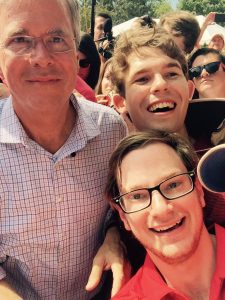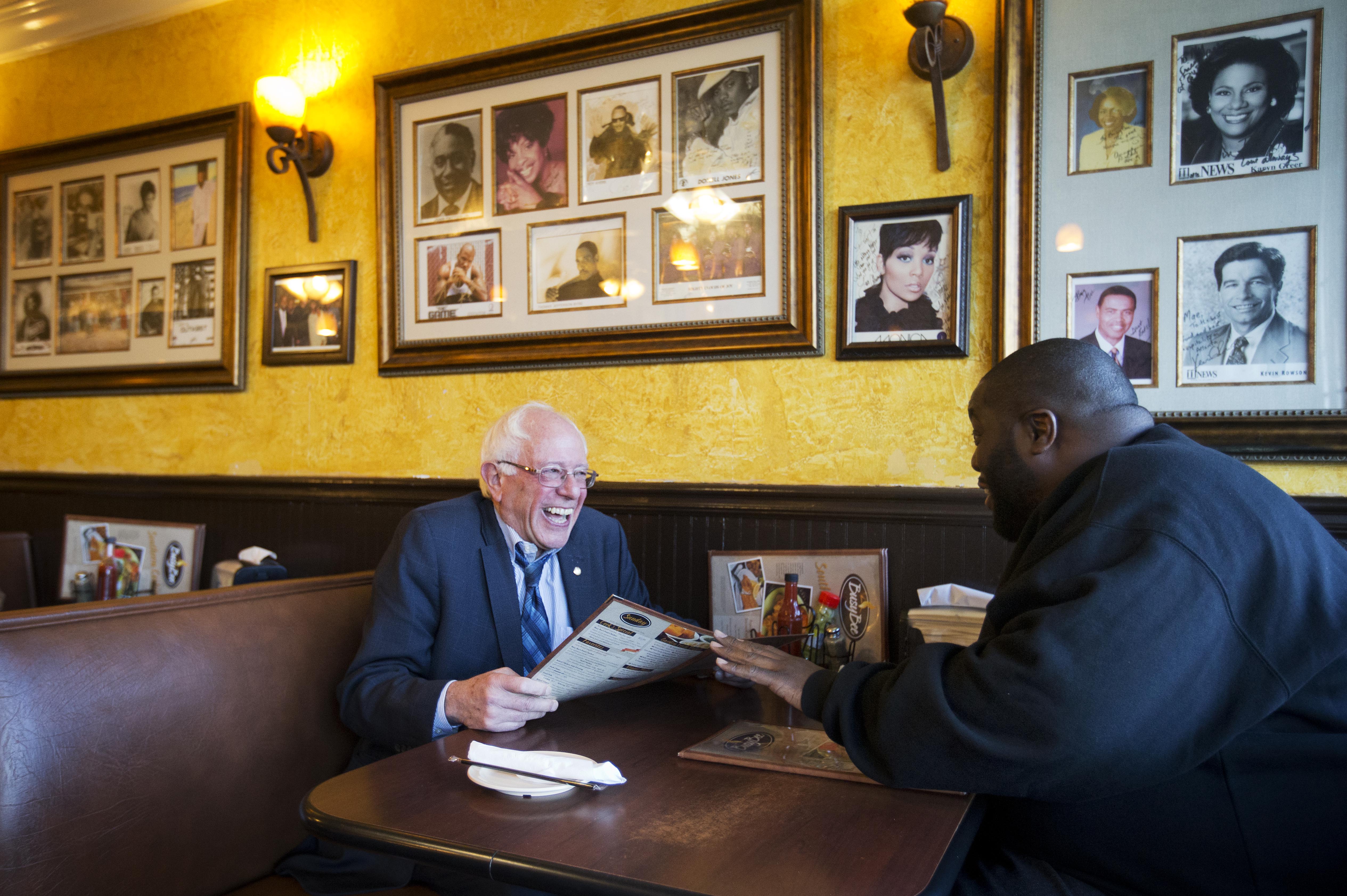On Monday night, I had the pleasure of seeing Bernie Sanders speak in Atlanta at a full-capacity Fox Theatre. Well, not just Bernie Sanders. Killer Mike of the rap group Run the Jewels spoke on behalf of the city as he introduced Bernie to the stage. And he provided quite the introduction:
It was certainly a hard act to follow. Unfortunately, Killer Mike has not (yet) declared his candidacy for President, but he has officially endorsed Bernie, becoming another member of the so-called political revolution. While Bernie’s “older Jewish uncle from New England” speaking style marked a stark contrast from Mike’s introduction, he delivered a powerful speech that left no one in the audience unsatisfied.
At least that was my assumption. If you left that speech wanting more then you have quite the attention span because Bernie waxed for at least an hour. I watched hundreds of supporters (mostly white males with a variety of unkempt hairstyles) stand at least every 5 minutes, cheering for economic populism and fighting valiantly against discrimination. Bernie touched on just about every major national political issue – wealth inequality, Wall Street, health care, incarceration, campaign finance, institutional racism, climate change, education, minimum wage, abortion, gay marriage, and more. It felt as though nothing could stop him, not even a supporter fainting right behind him who only returned to consciousness after a medic administered CPR (the Sanders campaign came prepared). “I didn’t know my oratory was so powerful,” Bernie joked after the man was helped off stage.

First let me make a couple things clear. I go to all sorts of political events – I am truly fascinated by campaign politics. I saw Jeb Bush speak in Athens at a “tailgate” at Herty Field (quotation marks because no food or drink was provided) before the South Carolina game and even coerced him into taking a selfie with me and my friends. That being said, I definitely lean to the left, and although I am really intrigued by Rand Paul and John Kasich, I will almost certainly be voting for a Democratic candidate for President in 2016.
Although I love Bernie, I am not a Berniebro (please read that article, you will find it funny unless you are, in fact, a Berniebro). Actually, Bernie supporters often irritate me with their intelligent elitism – i.e. the notion that everything Bernie does is necessarily altruistic while everything Hillary does is calculative and political. Or even worse, the idea that dissenters, especially those within the Democratic Party that, dare I say it, support Hillary, simply “don’t get” how Hillary has been “corrupted” by campaign finances. However, I would never refuse to listen to Kanye West just because his fans think he is the second coming – annoying supporters are not a sufficient reason to reject Bernie who seems genuinely well-intentioned.
Like most Bernie supporters, I agree with just about everything he says. Wealth inequality is out of control, campaign finance needs to be reformed and Citizens United should be repealed, climate change is the greatest threat to global security, black lives matter (and this should be explicitly stated without dodging the question), health care should continue to be expanded, etc. I could go on for a while. Even in certain places where I disagree with him like the minimum wage – it makes no sense to me why rural Georgia should have the same $15 minimum as New York City – he clearly is the candidate most in line with my broader political views, which is something I have in common with many younger liberals, especially college students.
But here is where I differ. How are any of these ideas feasible? In other words, if elected, Bernie Sanders can give as many awesome speeches as he wants, but how will he accomplish his objectives? All of his policy initiatives simply mirror legislation that he has introduced and supported as a Senator, and there is no clear vision for how any of his initiatives will be accomplished without the support of Congress. His banking plan, the “Too Big to Fail, Too Big to Exist Act,” exemplifies many of my criticisms – it resembles Carly Fiorina’s tax code in that it is only four pages long and “doesn’t actually have a plan.” Similarly, he stated at the Atlanta event that he would not support a Supreme Court nominee unless they are “loud and clear” about their opposition to Citizens United, entirely neglecting that such a clear denunciation would mean he or she would never get approved by the Senate. These are ideas that many can get behind, but do they have any real efficacy?
Perhaps the most pressing issue that both Democratic candidates need to address – and yes, I am purposefully excluding Martin O’Malley – is how they will deal with a divided government. Whether you ask Larry Sabato or Charlie Cook (Nate Silver has not released Congressional predictions yet), we will most likely be facing a GOP-controlled House of Representatives after the next election while the Senate is still up for grabs. This will severely hamstring Hillary, who the GOP absolutely loathes, but in my opinion will be even more limiting to Bernie Sanders’ agenda that leaves no room for compromise with conservatives.
2016 House Election Predictions by Lary Sabato’s Crystal Ball (218 Needed for Control)
| Democrats | Republicans | |
| Safe | 168 | 208 |
| Likely | 12 | 18 |
| Leaning | 7 | 5 |
| Undecided | 17 | 17 |
But aren’t I forgetting about the coming “political revolution?” Honestly, I am not holding my breath. Even though Bernie is certainly galvanizing support among the liberal base, this is not the majority of the electorate. Presidents win elections with diverse coalitions of different groups and interests, and it is naïve to think that winning a single election will fundamentally change political polarization and usher in a utopian democratic socialist society where obstructionism is no longer relevant.
Jamelle Bouie at Slate encapsulates my worst fears about a Sanders presidency far better than I could:
What happens to a Sanders agenda if he doesn’t have a Democratic Congress? What happens if he has one but has to compromise to the bone to win? What happens if it fails?
Sanders is a remarkable candidate who has inspired a lot of people to get involved and change the country. He’s the first socialist to gain traction in national politics since the first half of the 20th century, and he disrupts the narrow scope for ideological debate in the United States. But he’s also a politician, subject to the same forces as his peers, and neither he nor his allies can ignore the structural realities of American politics. If Sanders wants to be president, he needs a serious theory of change. Otherwise he’ll flail—and he’ll fail—and his supporters will wonder what happened.
President Obama also campaigned as the more liberal alternative to Hillary Clinton – he criticized her Wall Street connections as well as her vote in favor of the invasion of Iraq. But even after a massive voter turnout in the 2008 election (that I honestly believe was and will be stronger than Bernie’s political revolution), Obama was forced to cope with political realities and had an incredibly frustrating time advancing his ideals even under a unified Democratic government. One of my main criticisms of the Obama administration is that I do not think he was a great politician – rather than have meaningful and consistent dialogue with his opposition (his relationship with John Boehner was unusually terrible, they went almost two years without meeting face-to-face), he attempted to use the bully pulpit to shame Republicans for their inaction. Rather than inspire a revolutionary progressive movement, this drove a bigger wedge between the two parties and made passing any substantive legislation over the past couple years impossible.
Bernie will face an even tougher task – he is far more liberal than Obama (as evidenced by his socialist moniker) and will likely have to deal with a divided government. His ideas seem far too bold to be accomplished through executive action, and Hillary’s more incremental reforms and knowledge of bureaucratic infighting might actually allow her to accomplish more, even if her ideas are far less radical.
None of this is to suggest Hillary is the better candidate, just that she might be better positioned to accomplish her goals. Hillary is certainly imperfect – she’s a hawk (honestly my biggest criticism), she’s heavily influenced by Wall Street, and it is tough to gage what she actually stands for and believes (if anything). It also amazes me how I have yet to talk to a single person that is truly excited about Hillary – she supposedly has one of the largest primary voting blocs in history, but where are her advocates outside of actual Democratic politicians? However, the fact that she has a Super PAC does not make her “evil” or “corrupt” in my book, it just means she is a realistic politician who wants to win the election.
Ultimately, both candidates need to develop a theory of change, specifically discussing how they will accomplish their objectives in the midst of partisan gridlock. Bernie can rant on every major national issue, but his Atlanta speech and campaign writ large are still missing concrete proposals on how to accomplish his lofty goals. This Democratic primary is forcing me to choose between my youthful college optimism and what I have learned about the importance of the broader political process in my political science major. I am hoping a middle ground will emerge between Hillary’s pragmatism and Bernie’s idealism, but as it stands neither candidate has won me over. Progress is all about making steps in the right direction, and I plan on choosing the candidate that can accomplish the most good, not just the one with the best-sounding ideas.
Photo Credit: Atlanta Journal Constitution


